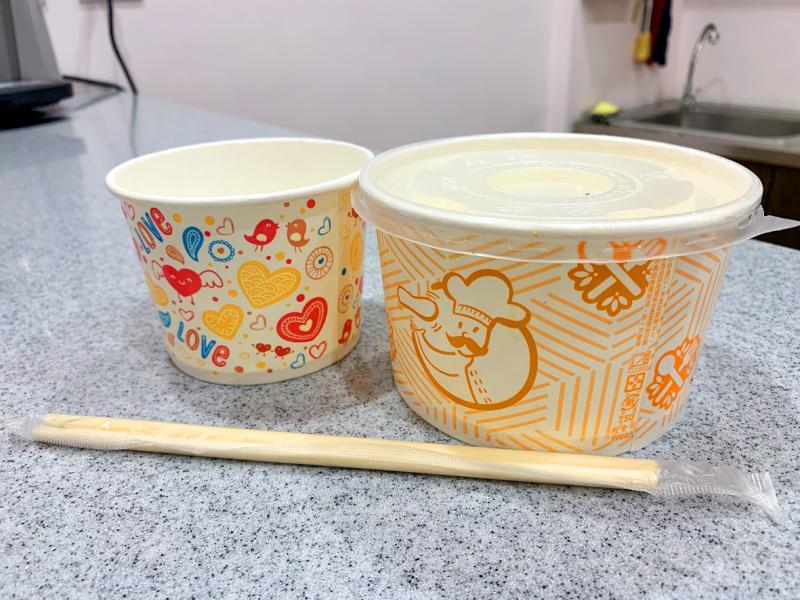Businesses operating at Taipei government agencies, schools and city venues run by outside contractors would be required to charge for disposable tableware, including cutlery and containers, starting from July 22.
A fee of at least NT$1 would be charged for each disposable container, plate, set of chopsticks or spoon in the approximately 280 designated venues, the city government said in a statement yesterday.

Photo: Chen En-hui, Taipei Times
It estimated that the measure is to cut the use of disposable tableware items by 27 million pieces per year.
The Taipei Department of Environmental Protection said the restriction would be carried out in stages, starting with public spaces and then moving to private operators of food services, to comply with a city ordinance passed in July last year on net-zero emissions management.
The city began in 2020 to charge fees for and recycle disposable tableware at 119 of the city venues run by contractors that provide such services, the department said.
Many public and private operators have joined in the initiative, and by strengthening plastic and waste-reducing policies, the city hopes people would be encouraged to prepare their own cutlery and containers, it said.
The department previously promoted restrictions on the use of melamine resin tableware in 2016.
As of last year, a total of 902 venues, including 38 markets, 13 night markets, 29 universities, 27 central government agencies, 119 outsourced venues, 53 department stores, 16 wholesale markets and 607 firms, have joined in, the department said.
Melamine is not heat-resistant and releases harmful chemicals when heated, the city said.

Japanese footwear brand Onitsuka Tiger today issued a public apology and said it has suspended an employee amid allegations that the staff member discriminated against a Vietnamese customer at its Taipei 101 store. Posting on the social media platform Threads yesterday, a user said that an employee at the store said that “those shoes are very expensive” when her friend, who is a migrant worker from Vietnam, asked for assistance. The employee then ignored her until she asked again, to which she replied: "We don't have a size 37." The post had amassed nearly 26,000 likes and 916 comments as of this

US President Donald Trump said "it’s up to" Chinese President Xi Jinping (習近平) what China does on Taiwan, but that he would be "very unhappy" with a change in the "status quo," the New York Times said in an interview published yesterday. Xi "considers it to be a part of China, and that’s up to him what he’s going to be doing," Trump told the newspaper on Wednesday. "But I’ve expressed to him that I would be very unhappy if he did that, and I don’t think he’ll do that," he added. "I hope he doesn’t do that." Trump made the comments in

Tourism in Kenting fell to a historic low for the second consecutive year last year, impacting hotels and other local businesses that rely on a steady stream of domestic tourists, the latest data showed. A total of 2.139 million tourists visited Kenting last year, down slightly from 2.14 million in 2024, the data showed. The number of tourists who visited the national park on the Hengchun Peninsula peaked in 2015 at 8.37 million people. That number has been below 2.2 million for two years, although there was a spike in October last year due to multiple long weekends. The occupancy rate for hotels

Taiwanese can file complaints with the Tourism Administration to report travel agencies if their activities caused termination of a person’s citizenship, Mainland Affairs Council Minister Chiu Chui-cheng (邱垂正) said yesterday, after a podcaster highlighted a case in which a person’s citizenship was canceled for receiving a single-use Chinese passport to enter Russia. The council is aware of incidents in which people who signed up through Chinese travel agencies for tours of Russia were told they could obtain Russian visas and fast-track border clearance, Chiu told reporters on the sidelines of an event in Taipei. However, the travel agencies actually applied